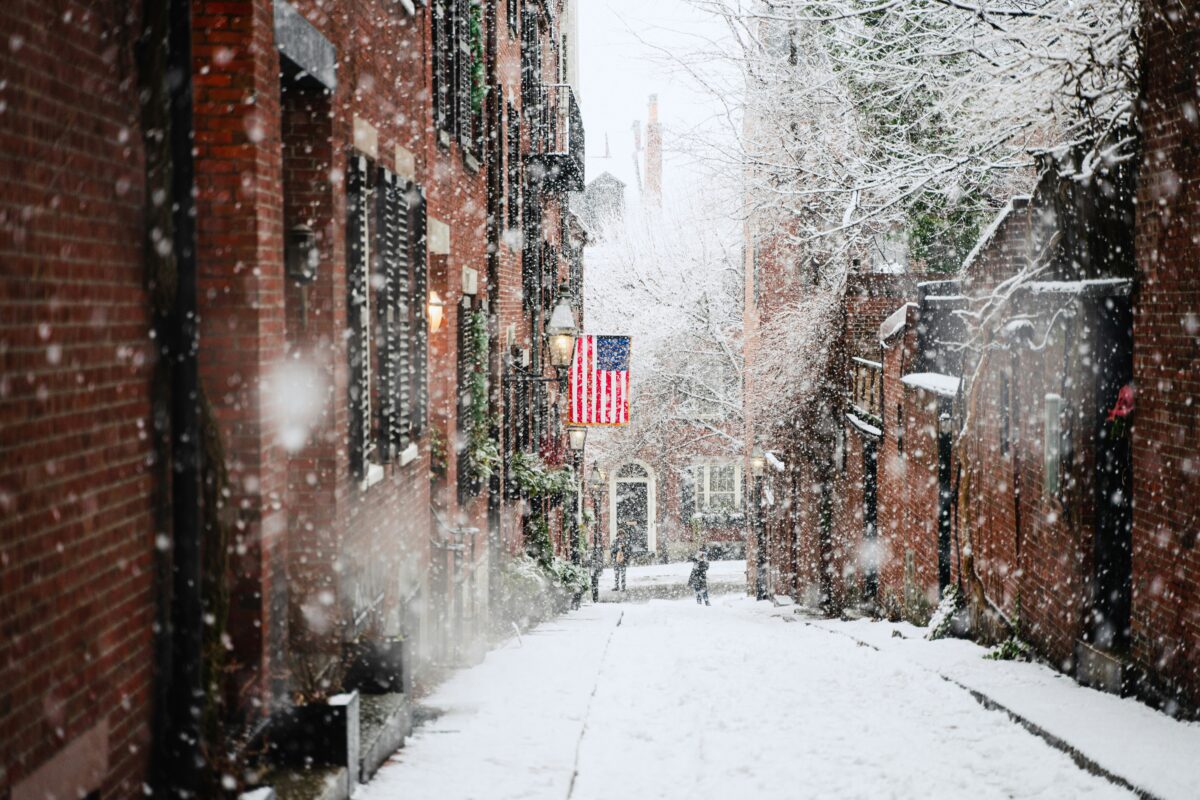In the past decade, Boston has experienced the most precipitation ever on record. It is no longer expected that Boston will have light snow or drizzling rain. When it rains, it pours, and when it snows, it’s a nor’easter. Winter seasons are now leaning towards two different extremes: low precipitation and high precipitation. In 2015, Boston had its snowiest winter in a hundred years, and only five years later, the second warmest winter on record. Regardless, Boston has been trending toward warmer years, specifically winters, since 2010. This is in part due to warmer air in the atmosphere causing higher levels of water vapor that create more low pressure systems, which bring warmer air and more precipitation.
What changes can Boston expect with warmer and wetter winters? For one, snow might become an anomaly. As warmer winters become normal, extreme winter blizzards will be more common than regular snowfall. This occurs because normal snow bands happen within a broader temperature range and blizzards occur in a more narrow range. Warmer temperatures edge out the broader snow ranges faster than the narrower extreme weather ranges. As winter temperatures rise, extreme snowfalls will become more frequent.
Climate is not the only thing changing because of the warmer winter. As the weather continues to warm, many important subsections of the Greater Boston economy will be affected. Some of the most notable impacts will involve the seafood and fishing industry. Warmer winter weather creates warmer waters, which aren’t as productive as cooler waters for fishing, because a lot of marine life swims toward cooler waters. Cooler water creates a weak barrier between the bottom layer of dense water and the less-dense surface water, so nutrient-rich water from the bottom can mix in with the surface water and provide nutrients for marine life. The fishing industry in areas like Boston has been adversely impacted by warmer waters.
These effects are predicted to grow worse with the changing climate. This is not isolated to the winter; it also affects the fishing industry year round. As warmer weather has increased, species of fish that used to be fished off the coast of Massachusetts are no longer available. One of the most popular—the cod (the namesake for Cape Cod)—is no longer present in the waters off the coast of eastern Massachusetts. This has caused fishermen to adapt by fishing for other species that are moving up with the warmer waters, creating a different ecosystem off the coast of Massachusetts.
Another unfortunate consequence of the warmer winter is an increase in ticks. Deer ticks are a problem in the Boston area from spring to autumn, and are known to transmit diseases such as Lyme disease. As the weather becomes more hospitable for ticks and other similar potentially-dangerous insects, they will become a more prevalent problem because warmer winters will not be cold enough to limit their growth by limiting populations of their host species.
The rise in deer tick populations is linked to the increase in the deer population in eastern Massachusetts, specifically the white tailed deer, which is attributed to climate change and lower hunting rates. The white tailed deer prospers in warmer temperatures. As the temperature in the north warms during the winter, it increases the range of the deer. Thus, as the temperature in eastern Massachusetts increases, the deer population also increases, which will directly increase the population of deer ticks and increase the rate of Lyme disease in the area. A 2003 Environmental Health Perspectives study predicted that climate change will increase the distribution of deer ticks by 70% later this century. This is just one example of how a warmer winter can affect the population of species and negatively affect the ecosystem in a region. This could bring consequences to the ecosystems in the Boston area and in the northeast in general.
Overall, a warmer winter will cause more problems in the future, as it will completely change the environment and ecosystem of the Boston area. These changes may not seem extreme at first, but they will become more severe as they create positive feedback loops and unexpected dangers arise. So far, Boston winters have warmed 2.4 degrees Fahrenheit above average. In January of 2019 and 2020, temperatures have reached 70 degrees Fahrenheit—numbers almost unheard of a decade ago. Climate change isn’t something that will happen; it is happening right here in Boston, and the effects are not going to be isolated to less snow and warmer weather. They will spread to ocean and land ecosystems, affecting several sectors of the city. To a long-time resident, it will be odd to think that one day Boston will not be known for its harsh winters or its booming fishing industry, but for something else entirely.
Sources:
Ambrose, K. (2019, August 16). The tick population is booming. Is climate change to blame? And will tick-borne diseases increase? Retrieved October 29, 2020, from https://www.washingtonpost.com/weather/2019/05/22/tick-population-is-booming-is-climate-change-responsible-will-tick-borne-disease-increase/
Brownstein, J., Holford, T., & Fish, D. (2003, July). A climate-based model predicts the spatial distribution of the Lyme disease vector Ixodes scapularis in the United States. Retrieved October 29, 2020, from https://www.ncbi.nlm.nih.gov/pmc/articles/PMC1241567/
Dawe, K., & Boutin, S. (2016, August 18). Climate change is the primary driver of white-tailed deer (Odocoileus virginianus) range expansion at the northern extent of its range; land use is secondary. Retrieved October 29, 2020, from https://www.ncbi.nlm.nih.gov/pmc/articles/PMC5058518/
Fisher, E. (2019, December 26). Warmest Decade On Record For Boston Area. Retrieved October 29, 2020, from https://boston.cbslocal.com/2019/12/26/warmest-decade-record-for-boston-area-blue-hills-observatory/
Fisher, E. (2020, January 21). Rain And Snow Extremes Evidence Of Changing Boston Climate. Retrieved October 29, 2020, from https://boston.cbslocal.com/2020/01/21/boston-climate-change-higher-rain-snow-totals/
A Fisherman on the Front Lines of Climate Change. (2020, April 16). Retrieved October 29, 2020, from https://www.nature.org/en-us/about-us/where-we-work/united-states/massachusetts/stories-in-massachusetts/climate-change-fisheries-impact/
Fraser, D. (2019, December 23). Study shows impact of climate change on fishing economy. Retrieved October 29, 2020, from https://www.capecodtimes.com/news/20191222/study-shows-impact-of-climate-change-on-fishing-economy
Gibbens, S. (2019, January 29). Why cold weather doesn’t mean climate change is fake. Retrieved October 29, 2020, from https://www.nationalgeographic.com/environment/2019/01/climate-change-colder-winters-global-warming-polar-vortex/
Thompson, A. (2019, December 23). What Happens to White Christmases as the World Warms? Retrieved October 29, 2020, from https://www.scientificamerican.com/article/what-happens-to-white-christmases-as-the-world-warms1/
Weiskopf, S., Ledee, O., & Thompson, L. (2019, March 03). TWS Journals. Retrieved October 29, 2020, from https://wildlife.onlinelibrary.wiley.com/doi/full/10.1002/jwmg.21649
Zeek, A. (2020, January 22). How a warmer winter can affect your health. Retrieved October 29, 2020, from https://news.iu.edu/stories/2020/01/iupui/inside/22-how-warmer-winter-affects-health-climate-change.html

